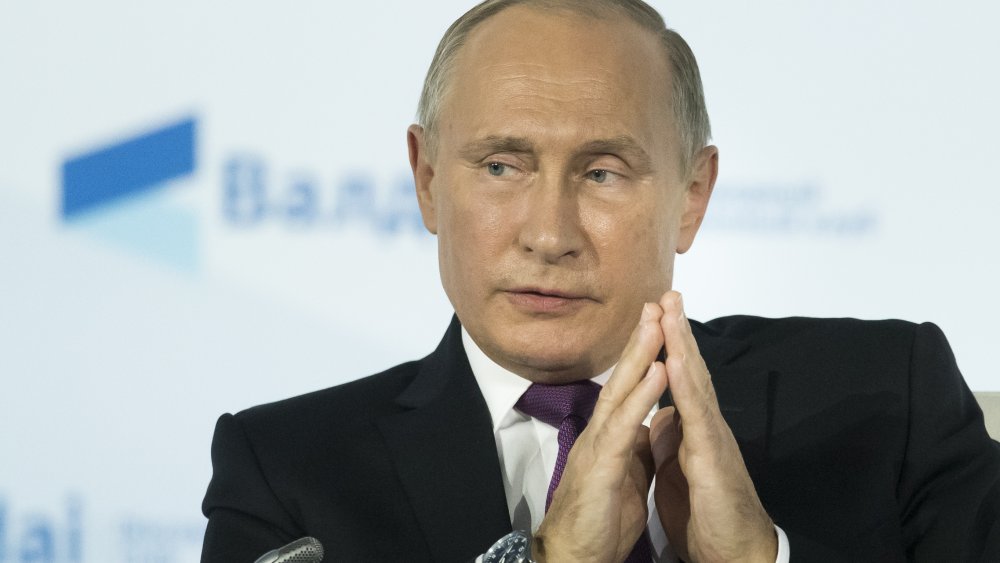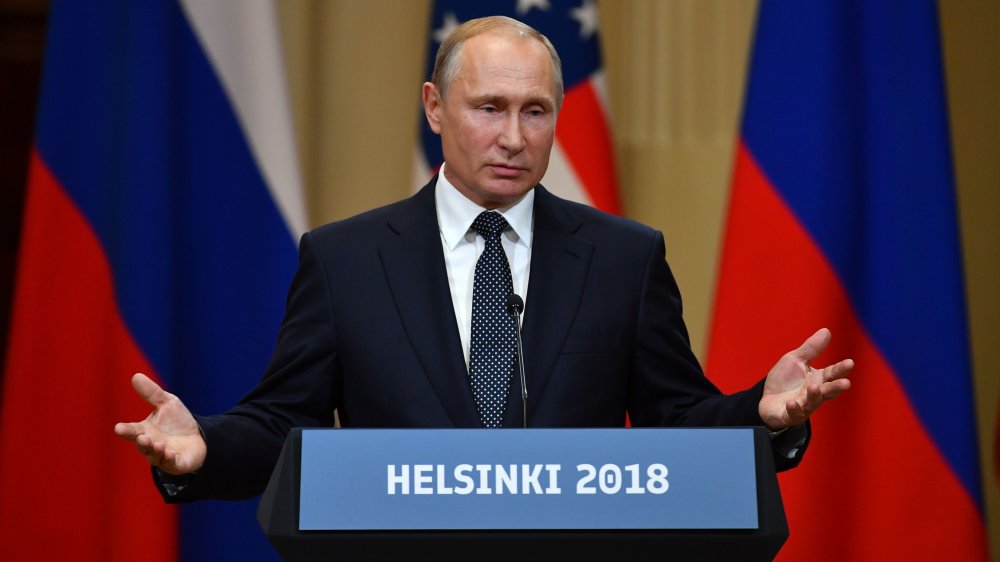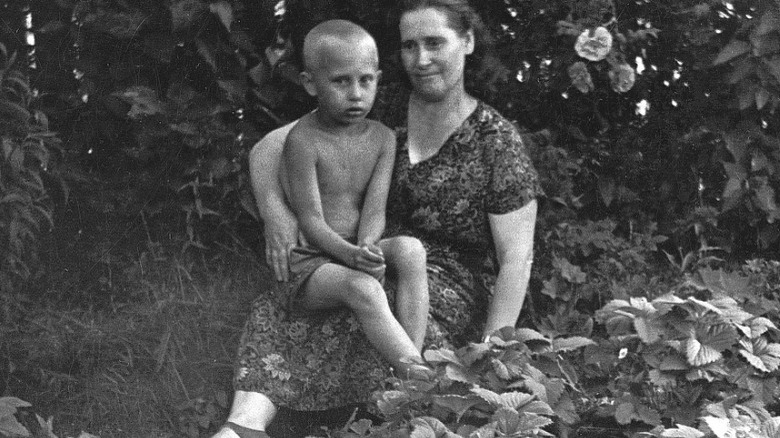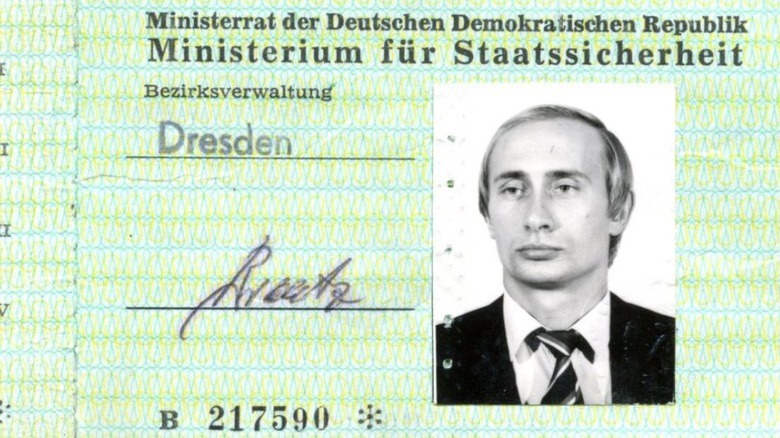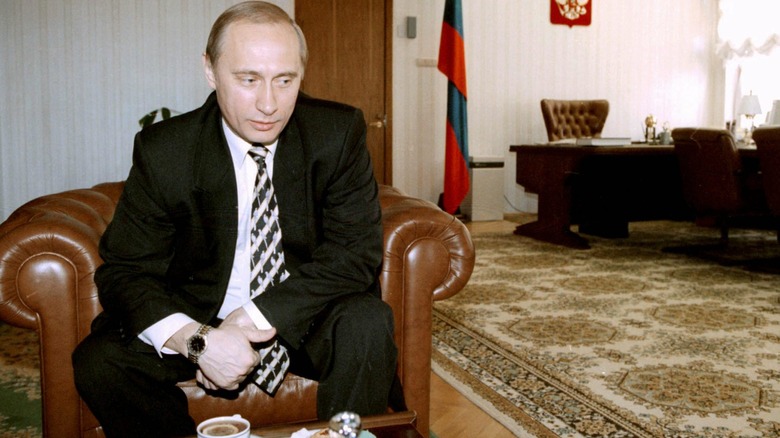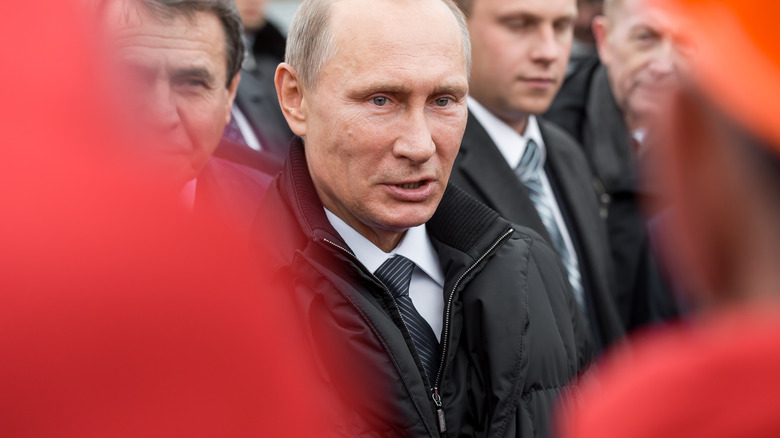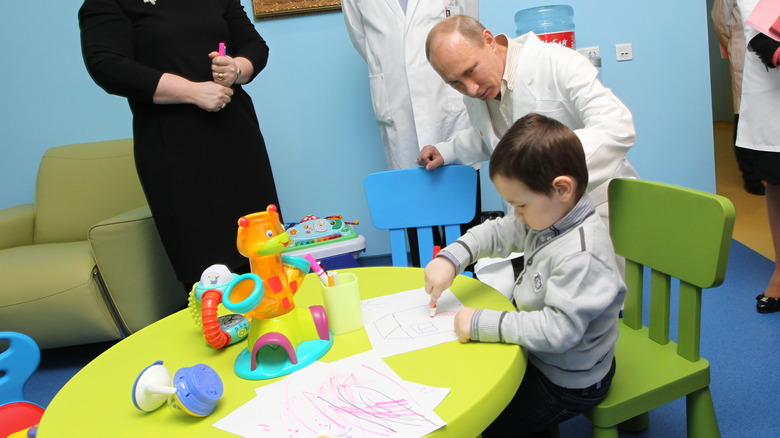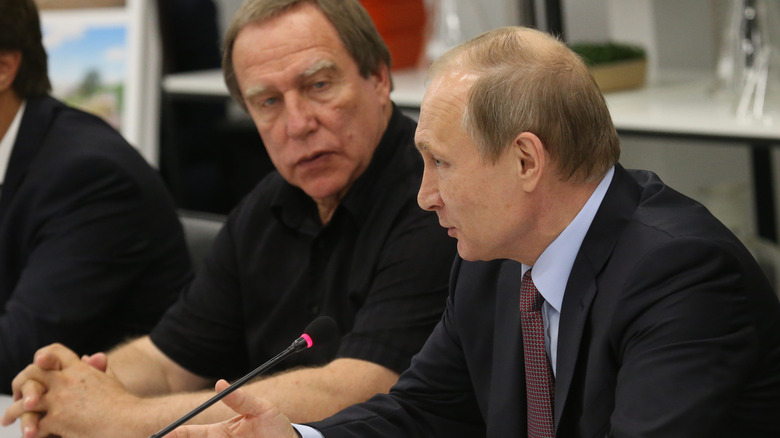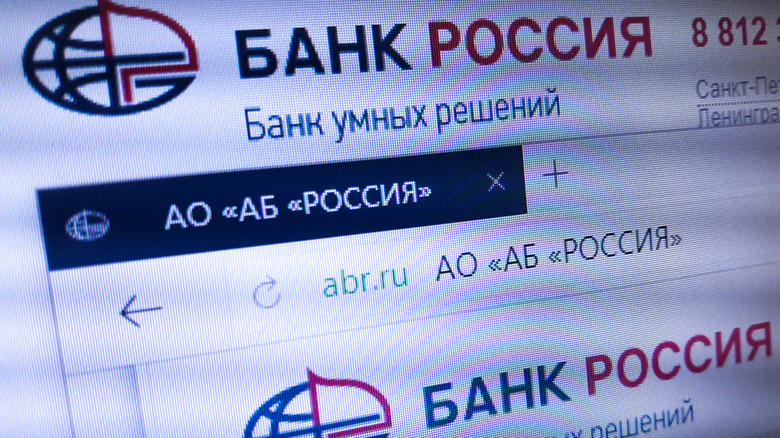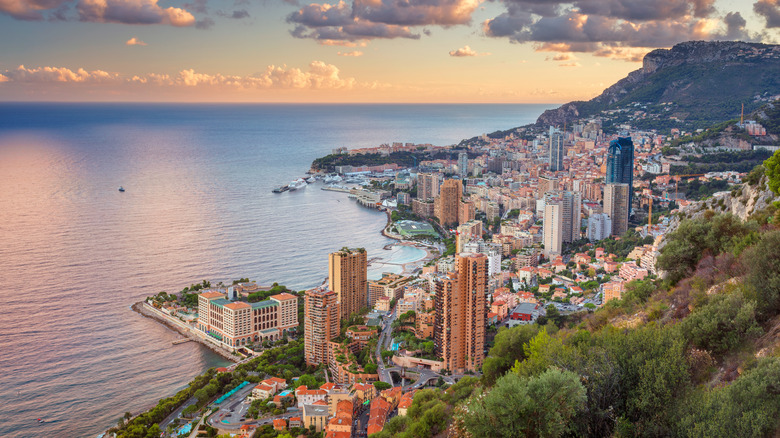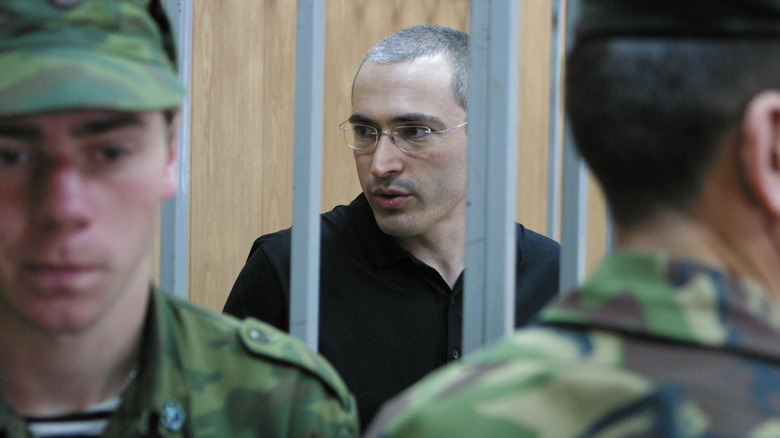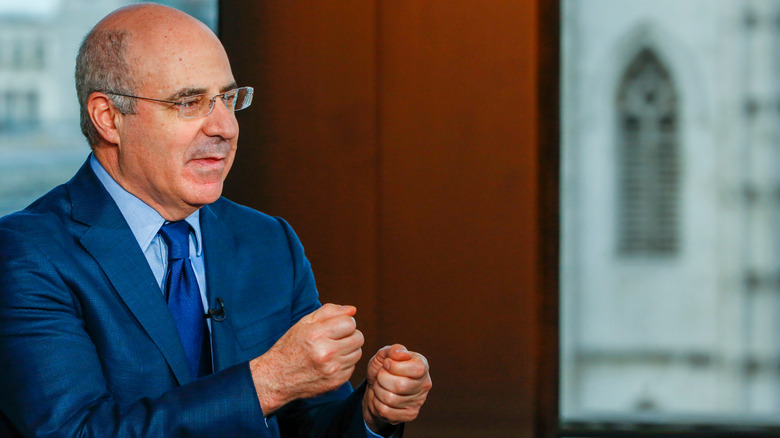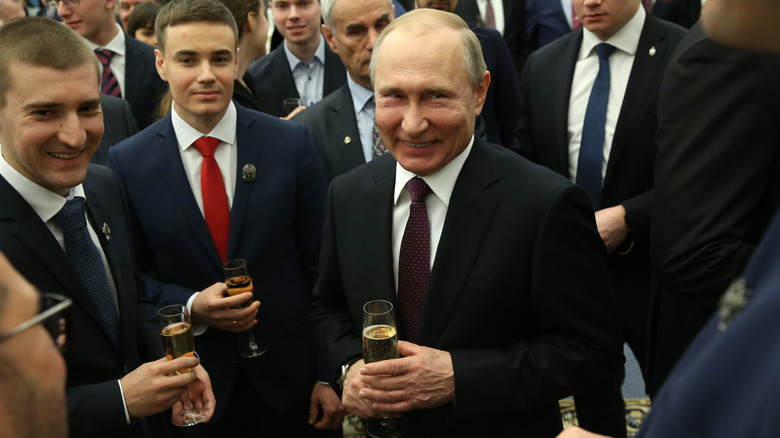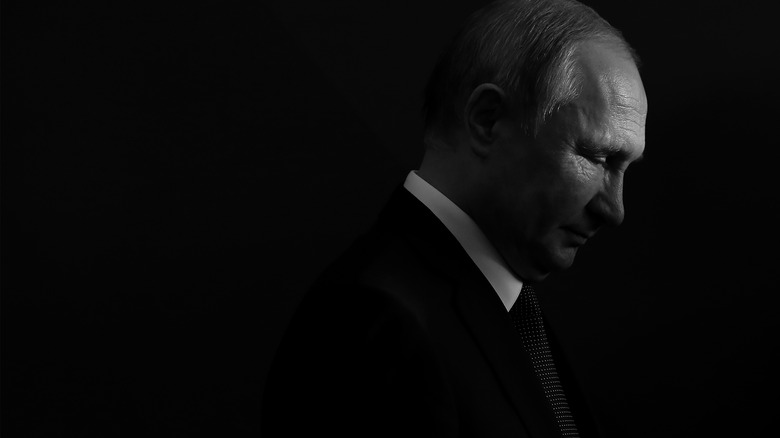Here's How Much Money Vladimir Putin Is Worth
Vladimir Putin is basically what would happen if a Bond villain won at the end of the movie. The former KGB spy turned Russian president seems to be behind various nefarious plots across the globe. In 2019, The Guardian reported that British Prime Minister Boris Johnson was accused of covering up Kremlin attempts to infiltrate the U.K. Conservative party. According to The Daily Beast, in 2018 Russian journalists were murdered while investigating Putin's possible use of mercenaries to control gold and diamond mines in the Central African Republic. In 2014, he literally stole a chunk of another country, namely Ukraine's Crimean peninsula. Per Newsweek, Putin uses judo principles in political decision-making. Since his fingerprints seem to be on everything, including gold, you might wonder how much money the man has to his name.
No one actually knows. According to CNN Business, experts have been trying to figure out how much Putin is worth for years. That's led to some skewed estimates, with some estimating his worth at somewhere in the neighborhood of $200 billion. That's in spite of the fact that in 2018, CNN reported that he officially had $243,000 in the bank. Eurasia Group senior analyst Jason Bush has a fascinating insight into why there's such a discrepancy, and says Putin's wealth is based on ownership in a less traditional sense of the word. What does that mean? Let's see if we can sort through some of what might be going on here.
Vladimir Putin's nyet worth
Well, there's good news, and there's bad news. The bad news is that Putin's actual net worth is shrouded in uncertainty, so for the time being, the best you'll get are wildly different estimates, as you'll soon see. In fact, according to Newsweek, Forbes refuses to place the Russian leader on its list of billionaires because his assets are unknown or untraceable. The good news is that his incalculable wealth actually inspired a rare moment of bipartisanship in the U.S. Congress when Democratic and Republican lawmakers alike introduced a bill seeking to suss out how much money he actually has.
You might think the author of this article is super-duper-stupid for writing a piece whose content literally can't deliver on what the title suggests. If so, you have a point. Seriously, what moron volunteered to write this? Much like Putin's wealth, it's anyone's guess. Newsweek reports that in 2012, political analyst Stanislav Belkovsky estimated his net worth to be $70 billion, based on investments in natural gas and oil companies. Financier Bill Browder placed the figure at $200 billion, which would make Putin the richest person on Earth. And it's possible that he's not a billionaire at all. In 2012, his annual income was listed as $140,000, and he and his wife had less than half a million in the bank. Yet he "had access to palaces and yachts and accepted numerous gifts, like $200,000 watches." With so many question marks surrounding his finances, Forbes should probably just list Putin as a "question-aire."
He came from nothing
In 2000, a book called "First Person" hit the shelves, and it was (says PublicAffairs) the transcription of more than 24 hours' worth of interviews with Vladimir Putin. With the exception of the journalists' questions, it's all written from his point of view — and early on, he talks about growing up, and coming from nothing.
At the time he was born, his mother (pictured, with him) was a factory worker and his father was serving in the army. They survived the blockade of Leningrad — barely: His mother was so weak she was believed dead, and placed alongside the other corpses. Later, his parents held a series of jobs: According to The New York Times, those jobs included working as a janitor, a toolmaker, and as a skilled laborer at a car factory. They ended up moving from a house to a fifth-floor apartment with no hot water, no indoor plumbing, and "hordes of rats in the front entryway."
Putin credited the rats for teaching him a very important lesson. He remembered chasing them as a child, and when they were cornered, they would stop running, turn, and strike. It was a bit of behavioral insight he never forgot.
What did he do as a KGB officer in Dresden?
Vladimir Putin, says the Los Angeles Times, was offered a job by the KGB in his last year of college, and in 1985, he was stationed in Dresden.
There are two different stories about what went on there, and let's start with what Russia Beyond calls "pretty routine work." The official line is that Putin was stationed an everyday grunt, and a lot of the memories of what life was like there seem straightforward enough. He's reflected on living a simple life, where finally saving enough money to buy a car was cause for celebration. His then-wife, Lyudmila, recalled (via the BBC) that at the time, she was envious of the Germans' higher salaries.
Still, it's widely believed that Putin's work in Dresden was much more important than anyone's letting on. Sven Scharl is a researcher on the Stasi — East Germany's secret police — and told Politico that tracing Russian activity in Dresden is difficult, because (as Putin has said himself), most of the paperwork has been destroyed. Still, the relentless downplaying of what Putin did in Dresden has led Stasi historians to believe he was working closely with a far-left terrorist organization called the Red Army Faction, and it was during his time in Dresden that he built up a spider web of contacts. It was that network, the theory goes, that ultimately allowed him to start seizing power and wealth across Russia.
Putin fully intended to get rich in office
Sergei Pugachev, says The Guardian, is the man who was once known as "Putin's banker." By the time they talked to him in 2015, it had been four years since he'd had a large portion of his assets — to the tune of about $15 billion — seized by the Russian government, before he went on the run. The seizure came after he was accused of using the bank he founded (Mezhprombank) to get loans from Russia's central bank, then funneling the money into his personal fortune. Pugachev said that none of it was true, and that he had been targeted by a massive asset grab after publicly speaking out against Putin.
Pugachev and Putin went back a long time, but still, Pugachev called his meteoric rise to power a "tragedy for Russia." He explained: "I don't think he's an evil genius ... He surrounded himself with like-minded people [and] They immediately began enriching themselves."
And that, Pugachev added, was kind of at the heart of the Putin he knew. Initially, Pugachev says that he had intended to spend a few years as president, take advantage of all the advantages there were, and then leave. Once, that was, he'd lined his own pockets. "Putin wanted to get rich, too," Pugachev says. "He was a pragmatic person. We talked about this. He didn't want to leave office poor."
Today, he owns some extravagant things that hint at a massive fortune
When it comes to official properties, Fortune says that in addition to his officially-recognized annual salary of $140,000, Vladimir Putin owns three cars, a trailer, and an 800-square-foot apartment. And, that's kind of it. But is it really?
It's not likely, they say, and they add that the $200 billion net worth figure that's often thrown about might not actually be that far off from the truth. Why? Because of the estimates that go along with the possessions and property he's been associated with, starting with watches. Putin seems to have a thing for luxury watches, seen wearing some that are worth upwards of $60,000, and reportedly owning one that's worth a mind-numbing half a million.
The other big red flag is the property that's affectionately referred to as "Putin's Country Cottage," which very well may be the pinnacle of Russian humor. The 190,000-square-foot mansion overlooks the Black Sea, has a 27,000-square-foot guest house, and includes a nightclub, amphitheater, and full bar (which is stocked with somewhere around $100,000 in alcohol). Even the toilet brushes come from Italy and cost $850 each. All of that cost around $1.4 billion ... with another $2 million spent each year for routine maintenance. It's worth noting that officially, the Kremlin says the mansion belongs to "a wealthy businessman." Even if that's the case, Putin has also been connected to 19 other properties, 58 aircraft, 700 cars, and a $100 million yacht.
Healthcare equipment? Or a palace for Putin?
In 2014, Reuters published the results of their investigation into a Russian scandal that went back nearly a decade, involved more than 100 people, and millions of dollars. It's complicated stuff, but in a nutshell, here's what they found.
Back in 2005, Putin had kicked off a plan to upgrade Russia's healthcare system with tons of new equipment. So far, so good. The problem came when people started looking at the numbers, and realizing that suppliers were charging way more than the equipment was worth. Investigators then claimed that the extra money then ended up in Swiss bank accounts, and from there, it was used to build the billion-dollar Black Sea mansion. The director of a Moscow think tank called the Institute for Post-Industrial Studies, Vladislav Inozemtsev, explained it like this: "The current system in Russia is based not on corruption in the traditional sense, but on a complete merger of public service and private business interests."
There were scores of people involved: The medical equipment came from Germany's Siemens AG, it was sold through a British company and then on to Russia, and then, the investigation extended to long-time associates of Putin's — like a former dentist named Nikolai Shamalov — who were involved in purchasing the equipment and building entirely new hospitals. The end goal? A mansion that Fortune says includes a casino and $1,250 toilet paper holders.
Putin ... and his frontman?
In 2016, the International Consortium of Investigative Journalists (ICIJ) published a report called "All Putin's Men: Secret Records Reveal Money Network Tied to Russian Leader." Front and center of their report was a man named Sergey Roldugin (left), who had been friends with Putin since long before his KGB days.
Roldugin was, on the surface, at least, a classical cellist and conductor who was widely known as the friend who shared a more cultured side of Putin. A massive document leak revealed something else, though: He was also the owner of a group of offshore companies that were connected to the movement of at least $2 billion in funds that were ultimately connected to Putin.
Like everything else in Putin's finances, it's complicated — but, the ICIJ says, Roldugin seemed to be the front man for companies involved in transactions that served to create an incredibly confusing paper trail that ended with money all being funneled into the pockets of those loyal to Putin. And, they say, perhaps Putin himself. Maybe. They write: "Loyalty and long-held relationships help bind the network together. It's a fraternity of Putin confidants." Along with Roldugin's seemingly invaluable position at the head of these companies, the document leak also connected the various players within the network in another way: They were all tied to Bank Rossiya.
Is one Russian bank his personal 'cashbox'?
In the 2016 report from the International Consortium of Investigative Journalists, they're careful to point out that Vladimir Putin's name is never mentioned ... but, they also say that's not surprising: When he's being discussed, either pseudonyms or a gesture to the sky is used in place of his name. They also say that an entire system of offshore companies — which includes locations in Switzerland and Cyprus — was created by Bank Rossiya, and the accounts overseen by the same bank. Incidentally, Putin's old friend, the cellist Sergey Roldugin? He owns 3% of Bank Rossiya.
That's been connected to Putin for years: According to The New York Times, not long after Putin annexed Crimea in 2014, he also shifted Russia's electricity business to Bank Rossiya — even though they were ill-equipped to handle it. At the time, that is — they also say that literal boatloads of money poured into the relatively small financial institution, and it became known to the Obama administration as "the 'personal bank' of the Putin inner circle."
The Guardian's review of the same data says it's clear: It's money moving into the pockets of "friends [who have] earned millions from deals that seemingly could not have been secured without [Putin's] patronage." How much of this benefits Putin directly, it's impossible to say. Still, when the U.S. sanctioned Russia in 2014 after Russia's takeover of Crimea, Reuters says that one of the conditions was that Bank Rossiya could no longer trade foreign currency.
Is some of his fortune in the hands of a longtime mistress?
Does Vladimir Putin have some of his fortune stashed away in the possession of a long-time mistress? That's the question posed by The Washington Post, and when they did a deep dive into the life of Svetlana Krivonogikh, they found that there was really no other way that they could explain how she went from living in a communal apartment and working a series of low-paying jobs to living in a $4.1 million luxury apartment in Monte Carlo.
It's an apartment, they add, that she bought in 2003, just a few weeks after giving birth. Kind of: The Post says that leaked documents say the apartment was bought by a shell company called Brockville Development Ltd. (which is owned by another shell company, Sefton Securities), and Krivonogikh was later named "beneficial owner." At the time Brockville bought the property, she had reportedly been romantically involved with Putin for a long time, and the daughter? No one's saying she's Putin's daughter, but the Post did note that her middle name is Vladimirovna, or "daughter of Vladimir."
They did some more digging, and more things surfaced about Krivonogikh — including Bank Rossiya's 2010 statement naming her as one of their largest shareholders. Attempts to determine whether or not Krivonogikh lived there were inconclusive, but the Post did note that even renting the apartment out would net the owner a cool $25,000+ per month.
Where does extortion come in?
CNN says there are a few different theories about where Vladimir Putin's fortune came from. One of the biggest is the possibility that some came after he made threats to some of Russia's ultra-rich oligarchs. "Pay me — in cash, shares and stocks, or stakes in your company," the thinking goes, "or else." Has the world seen the consequences of this? Maybe.
Vanity Fair did a deep dive into the life of Mikhail Khodorkovsky (pictured). At one time, he was the owner of the Yukos Oil Company (thanks to the privatization of Russia's natural resource companies under Yeltsin), the founder of a bank called Menatep, Boris Yelstin's economic advisor, and the richest man in Russia.
Khodorkovsky had a change of heart: Swearing off the relentless accumulation of wealth with the realization that ever as the super-rich got richer, the poor were getting poorer, he funneled his considerable assets into things like liberal arts schools, boarding schools for disadvantaged youth, and internet cafes. Still, in 2004 he still had a net worth of around $16 billion, but it wasn't going to stay: Just the year before, he had confronted Putin in a public forum, with a slideshow presentation, which had a slide called "Corruption Costs the Russian Economy over $30 Billion a Year." Not long afterwards, Khordorksky's associates began to be arrested, until finally, so was he. His assets seized, he was sentenced to nine years in a prison colony, one that was set up in 1967 to mine uranium.
So, where did that $200 billion number come from?
So, here's a question: Where did that $200 billion come in, and just where does that put him on the pantheon of the uber-rich? For comparison, let's just say that Investopedia says that as of 2022, there are 2,755 billionaires in the world, and the ones with the most billions are Elon Musk ($223 billion), Jeff Bezos ($178 billion), Bernard Arnault ($155 billion), and Bill Gates ($127 billion). In other words, that would put Putin in the top two.
VOA News cites Hermitage Capital CEO Bill Browder as the source of the estimate. In 2017, he testified in front of the U.S. Senate Judiciary Committee on the matter of Russia's interference with the U.S.'s 2016 election when he said: "I believe he is worth $200 billion ... The purpose of the Putin regime has been to commit terrible crimes in order to get that money."
Forbes says that Browder got that number by estimating that Putin had strong-armed the Russian oligarchs into giving him about half of what they were worth: He added up the net worth of all the oligarchs and divided it in half. Browder also confirmed what part of the difficulties were when trying to track down even conversations about finances, saying that when Donald Trump Jr. met with Kremlin-connected attorney Natalia Veselnitskaya to talk about "a ban on Russian orphans," they absolutely weren't talking about orphans — it was a code for lifting sanctions.
Sanctions are meant to hit Putin personally. Will they?
In January of 2022, the U.S. was discussing what to do about Vladimir Putin's advance on Ukraine. The answer was sanctions, sanctions, and more sanctions, but would personal sanctions actually hurt Putin? According to statements made by his personal press secretary, not really.
Dmitry Peskov gave this statement in response to the U.S.'s announcement that they were considering sanctioning Putin personally (via Forbes): "U.S. Congressmen and Senators who do not understand this topic talk about freezing assets, bank accounts, real estate, and so on, but this, apparently, is due to the fact that they do not have sufficient expertise and they are not asking those who professionally specialize in Russia."
It seems to be a reference to the fact that Putin's wealth is difficult to find, and suggests that whatever limits other countries seek to put on him, he's got a backup plan. The Guardian agrees, calling any plans to sanction Putin "largely symbolic," and here's the thing: political science professors from Penn State point out (via The Conversation) that prolonged, severe sanctions will hurt the Russian people way more than Putin.
Is it all smoke and mirrors?
There's one more theory that's worth looking at in conjunction with Vladimir Putin's net worth, and it's pretty much the idea that he just might be worth the exact opposite of $200 billion. That's to say, he's not really worth that much at all.
In 2022, Forbes took a look at one of the strangest of the theories regarding Putin's wealth, and it's the idea that it's all just smoke and mirrors. They call it "The Bluster Model," and it's explained by Bloomberg columnist Leonid Bershidsky. He wrote, "He has the whole country at his beck and call." They're the ones supplying him with things like his luxury watches, his properties, and his cars. Bershidsky continued: "It is enough for Putin to snap his fingers, and state-owned companies will cede assets to his friends at bargain-basement prices. A whisper from him, and wealthy private businessmen will chip in for the lavish refurbishment of a presidential residence."
The theory argues that the illusion of wealth is enough to grant him the power he needs ... so, which is it? Richest human on earth, or no? It's not only hard to tell, but hard to predict whether or not we'll ever know.
